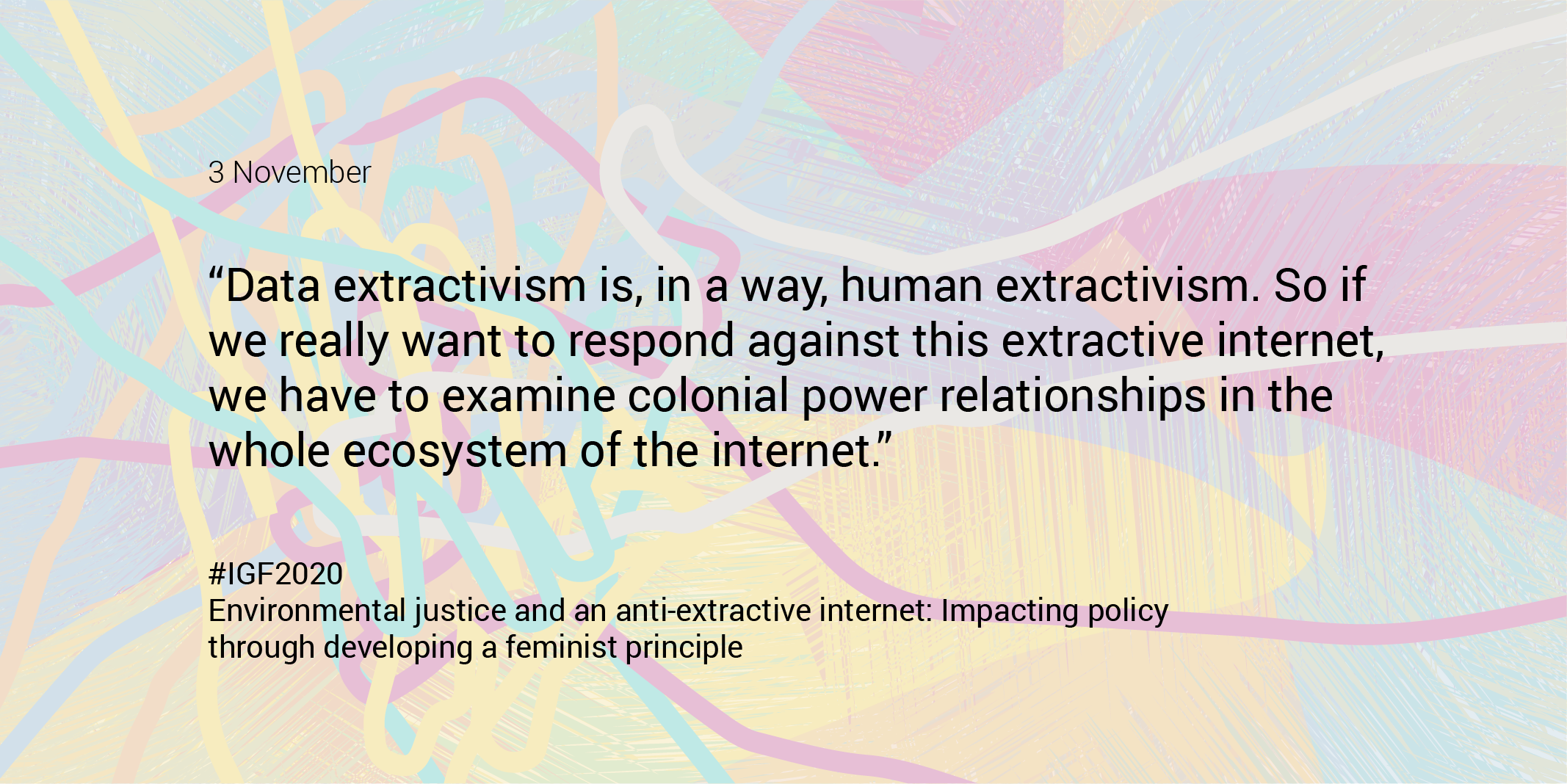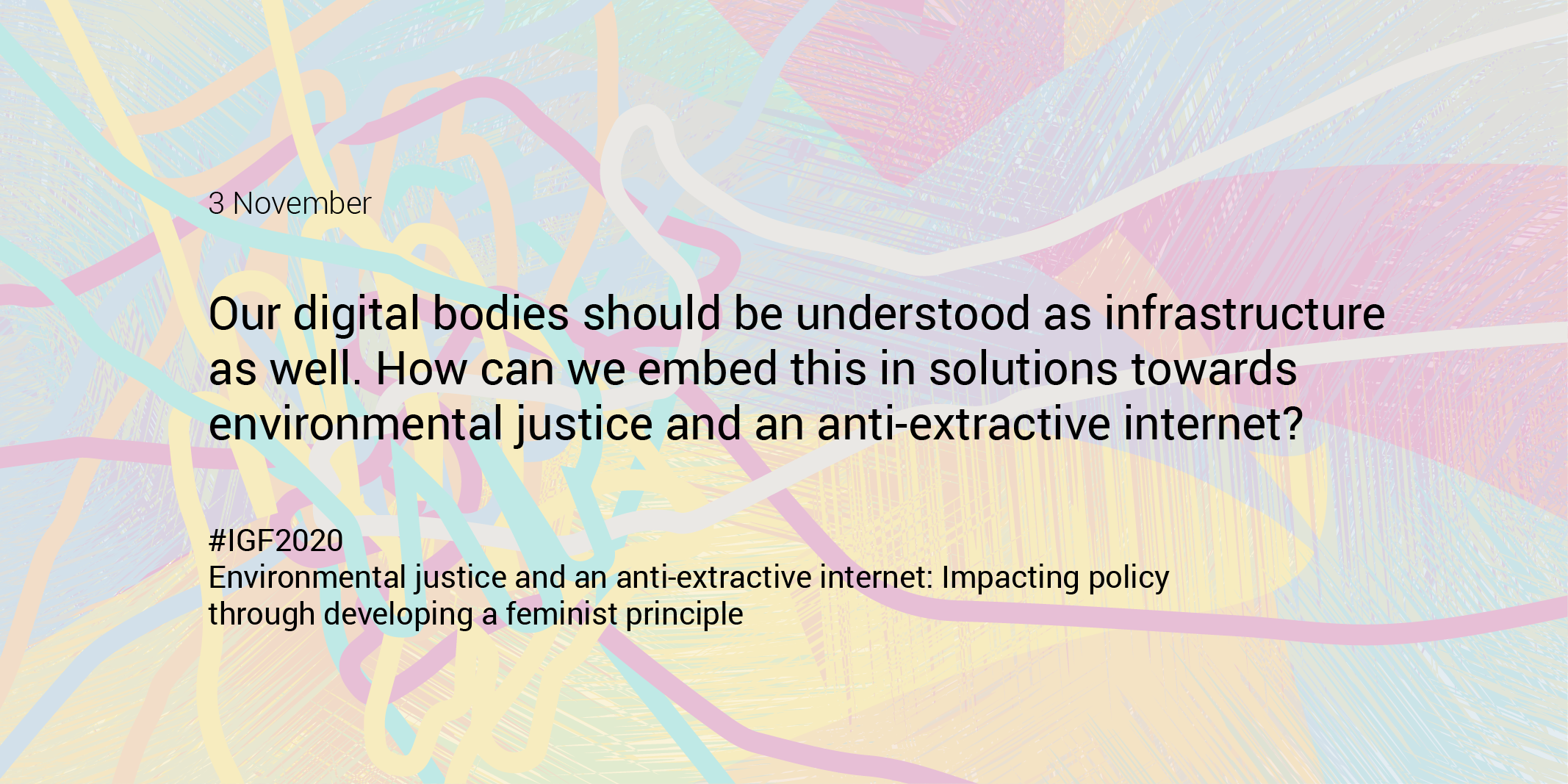The annual Internet Governance Forum (IGF), the United Nations’ most significant multistakeholder platform for discussing internet governance, is taking place from 2 to 17 November remotely. APC is participating in several activities, with a special focus on internet access and digital divides, which have been particularly exacerbated by the pandemic. Let's share some highlights from the first days at the Forum.
Some headlines from IGF 2020
2 November
UNESCO launch of IGF Dynamic Coalition on Internet Universality ROAM-X Indicators and presentation of national assessments
Based on its deep engagement with the IGF community in the past 15 years, UNESCO launched the Dynamic Coalition on Internet Universality ROAM-X indicators, which seeks to engage with all countries and all stakeholders worldwide to promote free, open and accessible internet for all.
.png)
Video of the session
3 November
Protecting the Public Core of the Internet: From formulation to implementation
In 2017, the Global Commission on the Stability of Cyberspace issued its flagship norm to protect the public core of the Internet, which is now part of EU law. This session offered an overview of recent developments and explored ways to advance a concerted multistakeholder approach to advance this norm.
Video of the session
National AI strategies and AI for sustainable development
Artificial intelligence (AI) and digital technologies offer developing areas significant opportunities and risks in a "more to gain, more to lose" paradigm. Countries can harness AI to address pressing social and economic problems, but AI can also exacerbate important societal risks. This session addressed ways for emerging and developing countries to build and harness artificial intelligence for their development objectives while mitigating key risks.
Video of the session
Lessons from the African Internet Rights Alliance (AIRA) on protecting digital rights in Africa
In this time of COVID-19, digital rights on the African continent are under threat more than ever before. Over the past five years, internet shutdowns, stifling of dissent, poor data governance and various forms of violence have persisted both by the government and the private sector despite increased calls for progressive policy and practice. This session explored interventions and ways for transnational collaboration, partnerships and coalition-building to protect and expand digital rights across Africa.
Internet Diverse - People United!
The development of AI systems often amplifies social injustice. Violence, control and surveillance are interconnected with traditional systems of social exclusion. This session opened a discussion aimed at engaging with people for whom AI causes injustice and leads to exclusion.
Civil society coordination meeting: A public interest internet discussion
This event acted as a convening and collaboration opportunity for civil society groups working on issues related to internet governance and policy.
Video of the session
Environmental justice and an anti-extractive internet: Impacting policy through developing a feminist principle
This interactive workshop explored ways to create a feminist principle for an anti-extractive internet and what this means for policy advocacy in internet governance spaces.


Video of the session
4 November
IGF 2020 Dynamic Coalition on Schools of Internet Governance
The Schools of Internet governance are vital in educating policy makers in the subject of internet governance. Part of digital inclusion involves understanding how the internet is run and how to affect the policies involved in maintaining and sustaining the internet, which is a critical feature of modern life. This meeting with members of the coalition who are directly involved in creating and sustaining the schools enabled outreach to those interested in schools on internet governance.
Video of the session
Internet Commons Forum
The structures of the internet affect us more deeply than ever before, reaching out to all aspects of our lives, from our societies and cultures to our finances and politics – to our very individual human behaviours and identities. This event explored different views of Internet Commons examining strategies for a less concentrated internet.
.png)
Video of the session
Community networks in times of crises and pandemic
The session explored the value of community networks to expand access and empower individuals and communities in times of emergencies, such as the COVID-19 pandemic.
.png)
Video of the session
Latin America in Glimpse: Automated decision making, discrimination and the internet
How are AI and automated decision making technologies shaping society in Latin America? This session explored this issue, with a special focus on historically marginalised groups.
.png)
Video of the session
5 November
Dynamic Coalition on Gender: Future unclear - Data and bodies in post-pandemic times
Researchers on data and body, online surveillance, and gender and technology gathered to share their findings from COVID-19 apps, privacy policies and their human rights concerns.

Video of the session
Equitable access to digital content: Lessons from COVID-19
The COVID-19 pandemic highlighted crucial questions around access to key digital resources and services at a time of crisis. This session took stock of emergency responses of libraries, governments, publishers and other key stakeholders – and their impacts on digital inclusion and access to information and content exploring

Video of the session
6 November
Net neutrality in times of COVID-19
The COVID-19 pandemic has demonstrated that free and non-discriminatory internet access is essential. This session discussed the importance of the various facets of internet openness during times of crisis.

Video of the session
NRIs Collaborative session: Access and digital inclusion
This session focused on the priorities and good practices on local levels related to access and digital inclusion. It specifically looked at the examples coming from the national IGFs of Bolivia, Colombia, Dominican Republic, Gambia, Haiti, USA and South Sudan.

Video of the session
9 November
Open data for women and persons with disabilities
Open data is data which is made accessible and available in a standardised machine-readable format and under a license that allows it to be re-used and re-shared. Open data policies should be able to provide frameworks for opening up access to government data and provide governance mechanisms. This session explored policies from governments highlighting the requirements for the successful implementation of open data for all people, including women and persons with disabilities.
Video of the session
Community networks, electricity and digital inclusion
How relevant are community networks in times of crises and pandemic? This workshop brought together key stakeholders to showcase best practices and innovative solutions within the global digital frameworks.
.png)
Video of the session
Opening ceremony
Over 200 participants listened to representatives from civil society as well as the public and private sectors. APC executive director Chat Garcia Ramilo was present at this opening ceremony, strongly representing our network.
.png)
.png)
Video of the session
Best Practice Forum on local content and inclusion
How can creative work and traditional work be preserved in the digital space? This forum hosted a discussion on local and indigenous content – its protection, preservation and sustainability.
Video of the session
Access challenges among rural communities and local solutions
According to the United Nations, 49% of the world is still unconnected, mostly people living in underserved areas, and rural and remote communities. This session explored practices that aim to serve rural communities and build sustainable systems, as well as policy suggestions to facilitate the creation of an enabling ecosystem for sustainable ICT-based initiatives in rural contexts.
Video of the session
11 November
Imagining an internet that serves environmental justice
Environmental justice is deeply intertwined with how the internet "works" – from the extraction of natural resources to produce and power the machines that connect us, to the increasing health and environmental impacts of electronic waste. However, dominant narratives focus on the relationship between technology and the environment at the "end" of the process, often taking a technocentric perspective. This session made a first step in crafting a shared policy advocacy agenda for internet governance processes to mitigate the impact of the environmental crisis and promote environmental justice and sustainability.

Video of the session
13 November
The circular economy of ICT
The choice and use of digital technologies and the policies guiding their production, use and disposal, as well as the recovery of raw materials, have a huge impact on our global environmental crisis, including potentials for mitigation and adaption. This session presented circular digital economy models and stories that are environmentally, economically, and socially sustainable.

Video of the session
Digital (in)accesiblity and universal design
A large majority of Persons with Disabilities globally are excluded from reaping “digital dividends” because most digital technologies are, by their design, not accessible to them. This session explored the state of the art of digital accessibility with a special focus on Low- and Middle-income countries, threw light at systemic barriers to accessibility and offered recommendations for implementation of accessibility policies by governments, development cooperation and the private sector.

Video of the session
Best Practice Forum on gender and access
The session looked at how issues related to violence, harm, pleasure and consent online (from a gender-diversity perspective) have been brought up at the IGF and whether the IGF has fostered the participation of women and gender-diverse people.
Video of the session
Will the real public interest internet please stand up?
What are the characteristics of a 'public interest Internet'? What are the current threats and challenges posed to it? This workshop addressed the characteristics of a public interest internet and current challenges to ensuring it, and examples of measures/proposals for measures which can protect the public interest internet.

Video of the session
National Regional Initiatives: The role of the internet in emergency situations
This session focused on concrete effects the emergency situations, such as the COVID-19 pandemic, had on people and role of digital technologies and policy. It looked into good practices that emerged for people to benefit more from digital technologies.
Video of the session
16 November
Sustainable #netgov By Design: Environment & Human Rights
This session mapped out concrete steps to ensure how the principle of environmental sustainability as fundamental to the SDGS and, in turn, their basis in human rights law and norms, can be fully integrated into the design, manufacturing, implementation, and procurement of internet-dependent technologies: from raw materials, to data storage and energy consumption, to disposal at the end of hardware lifecycles.
Video of the session
17 November
Checks and balances of data privacy within mass surveillance
The session explored the checks and balances of privacy protection related to the worldwide use of personal data for mass surveillance purposes. The discussion addressed assumptions and conditions in which huge amounts of personal data are sought out and used for, along with the potential risks and effects of these measures.

Video of the session